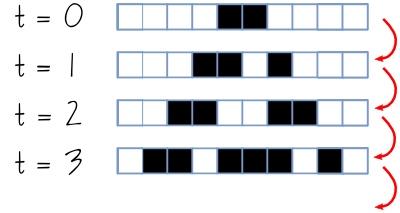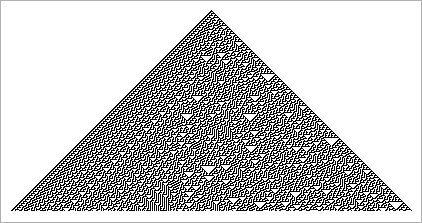Elementary cellular automatons.
published: 13/02/14, 14:41
A video of Stephen wolfram British scientist known for his work on cellular automata:
http://www.ted.com/talks/lang/fr/stephen_wolfram_computing_a_theory_of_everything.html
He is the founder of a new type of search engine called Wolfram Alpha: http://www.wolframalpha.com/ which responds to the entry of factual questions by calculating the answer from a database (in English for the moment ...)
His works are inspired particularly by the famous "Game of Life" of John Horton Conway: http://fr.wikipedia.org/wiki/Jeu_de_la_vie
The principle is simple: from extremely limited rules, it is possible to generate by iteration an evolutionary process that can reach a higher level of complexity, for example:


This gives, if we proceed to very many iterations in the following figure (called rule 30):

What is interesting in this figure is that from completely determined rules it is possible to quickly generate appearances of figures completely random see chaotic ...
Beyond a simple theoretical demonstration, such work could have outlets in fields as varied as computer science, biology, astronomy etc ...
http://www.ted.com/talks/lang/fr/stephen_wolfram_computing_a_theory_of_everything.html
He is the founder of a new type of search engine called Wolfram Alpha: http://www.wolframalpha.com/ which responds to the entry of factual questions by calculating the answer from a database (in English for the moment ...)
His works are inspired particularly by the famous "Game of Life" of John Horton Conway: http://fr.wikipedia.org/wiki/Jeu_de_la_vie
The principle is simple: from extremely limited rules, it is possible to generate by iteration an evolutionary process that can reach a higher level of complexity, for example:


This gives, if we proceed to very many iterations in the following figure (called rule 30):

What is interesting in this figure is that from completely determined rules it is possible to quickly generate appearances of figures completely random see chaotic ...
Beyond a simple theoretical demonstration, such work could have outlets in fields as varied as computer science, biology, astronomy etc ...